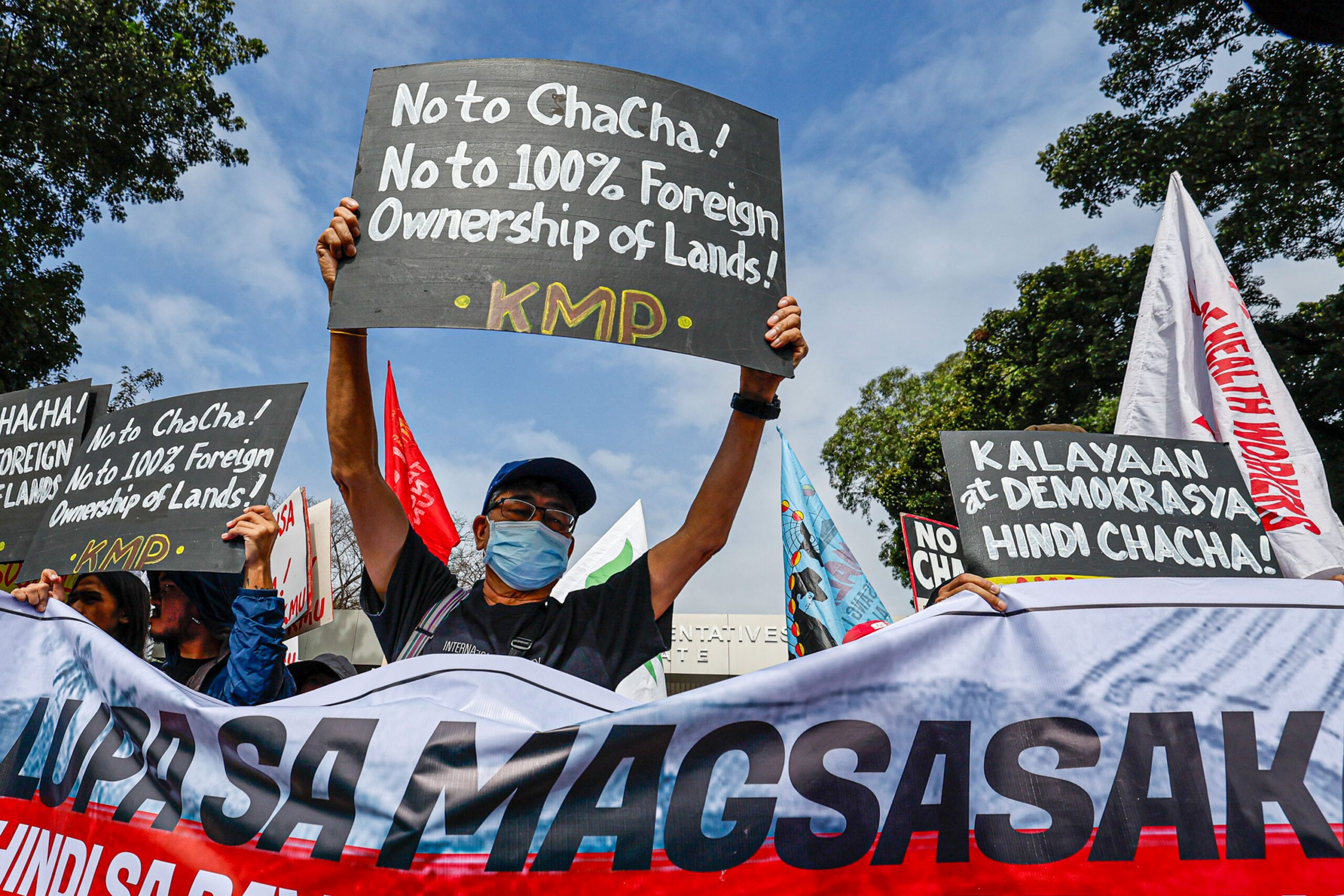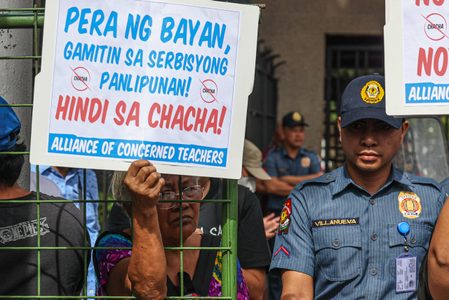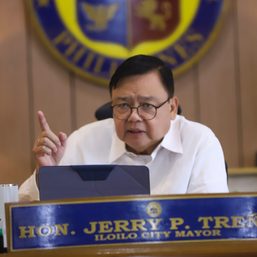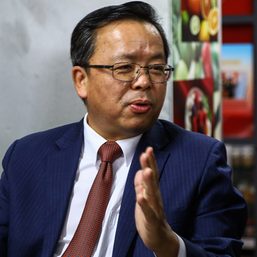SUMMARY
This is AI generated summarization, which may have errors. For context, always refer to the full article.

MANILA, Philippines – The clock is ticking for charter change advocates, and their biggest “enemy” is the 2025 elections.
Next year’s vote is a blunt reminder that they have little time left to make magic happen, as preparations for the midterm polls kick into high gear later this year.
The most straightforward deadline appears to be October 2024, a month where hundreds of thousands of aspirants for public office – from municipal councilor up to senator – file their certificates of candidacy.
Some lawmakers who have admitted pushing for charter change have recognized this cutoff.
“Remember that the [candidacy filing] is in October, so if we cannot have the plebiscite by July, then this charter change push would be over,” Surigao del Sur 2nd District Representative Johnny Pimentel told Rappler on January 10.
Albay 2nd District Representative Joey Salceda, in a separate conference with reporters on January 18, also doubled down on the target plebiscite in July.
“The enemy of that timeline is by October, we will be filing already and there is no talk about them going on parallel. Only 2025 will be on their mind because there will be an election,” said Salceda, chairman of the ways and means committee in the House of Representatives.
The need for a plebiscite
A referendum in relation to charter change stems from the route that advocates chose to amend the 1987 Constitution.
Beginning January, reports surfaced nationwide that voters were being requested to sign signature forms in support of the people’s initiative.
Specifically, people were being asked to back a proposal to amend a constitutional provision that is silent on whether the House and the Senate would vote jointly or separately should someone make a motion to form a constituent assembly.
If proponents get an enough number of authentic signatures, and if the Commission on Elections (Comelec) grants their petition, a plebiscite or referendum will be triggered to ratify the proposed amendment.
The push appears to have come from the House of Representatives, with Speaker Martin Romualdez unveiling the people’s initiative plan as early as December, although he has since distanced himself from the signature drive.
The proposed amendment – if ratified – would significantly diminish the power of the 24-member Senate, whose numbers will never size up to the 300-plus-member House of Representatives in a constituent assembly.
“We will highly recommend that we embark on a people-centered initiative to cure this impasse, so to speak, on how we vote,” Romualdez said in Iloilo last month.
Target signatures met?
Under a people’s initiative method to amend the Constitution, proponents must gather 12% of signatures nationwide, and every legislative district must be represented by at least 3% of registered voters.
On paper, that is not an easy task to complete, especially in districts where lawmakers are lukewarm or outright against charter change. It is an open secret, after all, that a congressman’s support expedites projects of this nature.
In the Davao region, lawmakers Paolo Duterte, Isidro Ungab, and Pantaleon Alvarez have rejected the people’s initiative. In Bicol, Albay 1st District Representative Edcel Lagman is the most vocal critic.
But if Salceda is to be believed, targets have been met. He said all districts have breached the 3% threshold, while 12.1% of signatures – accounting for eight million voters – have been gathered nationwide.
A January 24 report from the Comelec said only 192 out of 254 districts nationwide have received signature forms in relation to charter change.
Logistical burdens
Gathering the signatures is one thing, but shaking the Comelec’s 2024 calendar – which is heavy on preparatory activities for the 2025 elections – is another issue of its own.
“We have a timetable on everything, and our timetable has been disrupted because of the possibility [of a plebiscite this year],” Comelec Chairman George Garcia said in the Kapihan sa Manila Bay news forum on January 24.
He gave a bleak outlook on the possibility of a plebiscite, saying that a vote by August or September might be doable had the signature forms been submitted in the first week of January.
Opposition party-list group Kabataan, citing House sources, previously alleged that charter change proponents are hoping that the Comelec would finish verifying the signature forms by March, and would rule on their petition by April.
“We don’t have a period to make the determination [on the sufficiency of the petition]. It is possible that the determination would take a year,” Garcia said.
By October, all Comelec personnel nationwide – from the main office down to the field offices across the country – will be spread thin, focusing on receiving candidacy documents.
Other poll preparatory activities will spill over to the rest of the year and to the first few months of 2025, and those are expected to be doubly demanding than past elections as the Comelec attempts to recalibrate the 2025 automated election system.
Window for reform
Political observers know that the best time to push for divisive measures is during the early years of a president’s term in Malacañang. This is because after the midterm polls, Congress no longer becomes a conducive environment for controversial legislation.
Veteran political journalist Carmela Fonbuena took note of this when she summed up the decade-long journey that the reproductive health (RH) bill overcame before then-president Benigno Aquino III signed it into law in 2012.
Allies made a huge effort to rush the passage of the RH bill in the final month of 2012, to avoid pushing back its timeline to 2013, an election year.
The administration of Rodrigo Duterte also took a giant step to push for federalism in the first three years of his presidency, but abandoned his key campaign promise after the 2019 midterm polls. Analysts said Duterte lost political capital as his allies began positioning themselves for the 2022 presidential elections.
Congressman Salceda is aware that the political landscape is susceptible to change after the midterm polls conclude.
“I emphasize that the time to do constitutional reform is now, when we do not have to worry about this being a way to extend the President’s term. The window for reform will close after the 2025 midterms, and we may have to start anew from scratch. We need to do this now,” he said in a statement on January 14.
There is an understanding that many key legislations in the Philippines – where Congress is filled with allies of the President – moves forward if he gives his blessing.
President Ferdinand Marcos Jr. has become more publicly eager about charter change, from completely dismissing the idea last year, to underscoring the need for economic amendments today.
Does he see a golden opportunity? Will he go all in? – Rappler.com
(All quotes in Filipino were translated into English, and some were shortened for brevity.)
Add a comment
How does this make you feel?





![[Be The Good] Freedom from ignorance, apathy](https://www.rappler.com/tachyon/2024/06/be-the-good-carousel.png?resize=257%2C257&crop=461px%2C0px%2C1080px%2C1080px)









![[Just Saying] Reciting a hymn and pledge: Illegal, punitive, unconstitutional](https://www.rappler.com/tachyon/2024/06/20240612-reciting-hymn-pledge-unconstitutional.jpg?resize=257%2C257&crop=338px%2C0px%2C720px%2C720px)
![[Just Saying] Demonizing divorce and the mockery of our Constitution](https://www.rappler.com/tachyon/2024/06/TL-Demonizing-divorce-mocking-constitution-June-6-2024.jpg?resize=257%2C257&crop=265px%2C0px%2C720px%2C720px)
![[ANALYSIS] A Rube Goldberg cartoon of our inconvenient reality](https://www.rappler.com/tachyon/2024/05/tl-inconvenient-reality-05092024.jpg?resize=257%2C257&crop=280px%2C0px%2C720px%2C720px)
![[Vantage Point] Philippine economic reforms run into headwinds](https://www.rappler.com/tachyon/2024/05/ph-economic-headwind-may-2024.jpg?resize=257%2C257&crop_strategy=attention)
![[In This Economy] Economic charter change is very unpopular – it’s time lawmakers listened](https://www.rappler.com/tachyon/2024/04/in-this-economy-charterchange.jpg?resize=257%2C257&crop=292px%2C0px%2C720px%2C720px)





There are no comments yet. Add your comment to start the conversation.